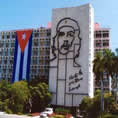




 50 years after the revolution – where is Cuba going?
50 years after the revolution – where is Cuba going?
50 years ago, in the night before January 1, 1959, the Cuban dictator Fulgencio Batista fled the country. The next morning, rebel troops under the young lawyer Fidel Castro entered the city of Santiago de Cuba. However, the Cuban Revolution was not only the work of a few thousand guerrillas. The students whose protests against Batista had closed down the country’s universities and especially the workers’ movement whose general strike had paralyzed the capital also played an important role in forcing the dictator to flee.
The capture of Santiago marked the victory of a revolution which was still not socialist. Castro explained: “The Cuban Revolution is not red but olive green.” But the U.S. government could not even tolerate an independent, non-socialist regime in its semi-colony of Cuba: it imposed sanctions against the Castro government, which then had to turn to the USSR for help.
Castro declared on April 16, 1961, two years after the capture of Santiago, that the revolution had been socialist. At that time, Cuban and foreign capitalists were expropriated and a planned economy was established. However, this economy was not controlled by the masses in councils, only by their self-appointed “vanguard”, a party and government bureaucracy.
Since Cuba is not directly subordinated to the capitalist market and its constraints, Cubans enjoy rights that would be a dream come true in other countries of Latin America: there is free health care for all people so that the life expectancy is 77 years, and the literacy rate is higher, the infant mortality is lower than in the USA. There are no Cuban soldiers in foreign countries – instead there are helpers supporting health care programs in Venezuela or literacy campaigns in Bolivia.
Nevertheless, the Cuban economy is characterized by inefficiency and corruption. The bureaucrats who steer the economy are not capable of measuring the needs of the people or utilizing their skills effectively. Only a democratically planned economy would be able to do this.
Socialism?
Especially after Fidel Castro resigned last year and his younger brother Raul took office, the question arises: Where is Cuba going? Essentially there are three perspectives:
1) the Cuban elite that was expropriated in 1959 and has been loafing in Miami ever since, and the U.S. government would like the following: the Cuban regime should be removed and replaced by one that is obedient to the USA. This would allow Cuba to become a low-wage country without any social protection for its inhabitants, just like its neighbors in the Caribbean.
2) parts of the bureaucracy that have dominated Cuba since the revolution wish the following: the Cuban economy should, step-by-step and under the leadership of the Communist Party, be transformed into a market economy. This “Chinese path” is mainly pushed by the Cuban military which runs many joint ventures with foreign corporations.
3) parts of the working class, which suffers from political repression, would like the following: the Cuban economy should be democratized, the bureaucracy toppled and replaced by a system of democratic councils. This could put the corruption and the creeping introduction of capitalism to an end.
Another revolution?
The Cuban government has become very popular because they, in contrast to most Latin American governments, do not simply parrot the orders from Washington. But their system is inherently very unstable and sooner or later must yield to a “normal” capitalism or a democratic socialism. If the rights of the Cuban people are to be preserved, the last option must be implemented.
Socialism must be international. An island with 11 million inhabitants which barely has any industry and is threatened by U.S. imperialism cannot build up a socialist system by itself. Therefore, a political revolution against the bureaucracy must be part of a revolution in the whole Latin American continent. The uprisings in recent years in Argentina, Bolivia, Venezuela and many other countries make clear that not only Cuba would benefit from a break with the market economy.
Such a revolution against the bureaucracy would not mean that all members of the Communist Party would need to be removed from office – no doubt there are many among them who are more committed to socialism than to the regime. But it does mean that the bureaucratic caste, which via the tourism industry gets enormous privileges in comparison to the normal population (mobile phones, DVD players and better food), must be toppled and replaced by workers’ councils.
In this sense, we defend the achievements of the Cuban Revolution against attacks from outside, whether from the U.S., EU, Mexico… But we also defend the planned economy against those parts of the bureaucracy (such as the higher officers’ caste) that would prefer to completely abolish it in order to carry over their privileges into a capitalist system. Solidarity with the Cuban Revolution also means support for an independent workers’ movement which will change the system fundamentally.
by Wladek, Revo Berlin
Leave a Reply
